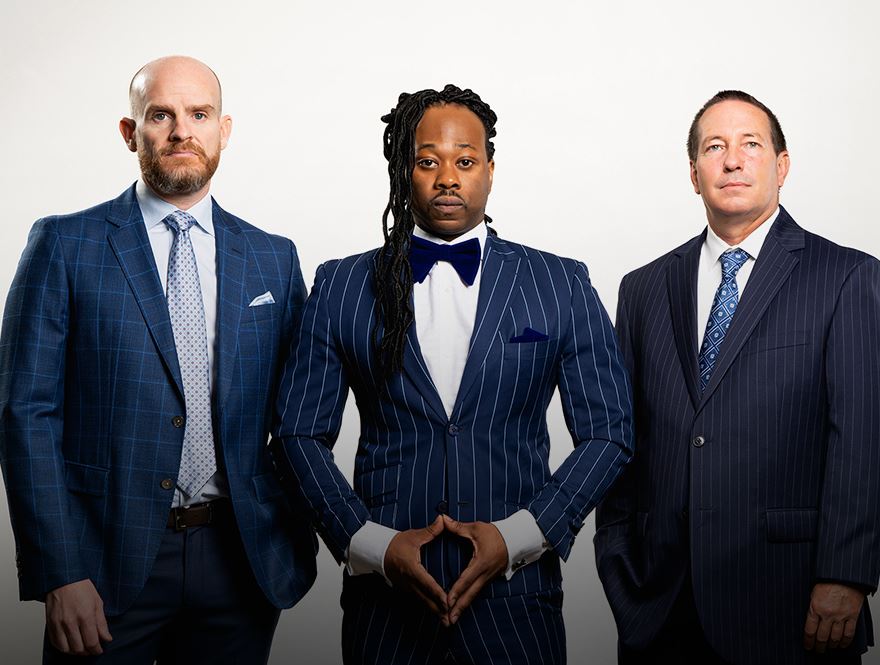
Willie Powells is considered to be one of the finest injury lawyers practicing in Houston. Your case will be in the hands of an attorney who genuinely cares about you, your family, and your future.

Houston Wrongful Death Attorney
Compassionate Legal Support For Families Seeking Justice in Texas
If you have lost a loved one through someone else’s negligence or wrongdoing, no award or settlement can compensate you for the loss you have suffered. A wrongful death claim is a legal action to hold the responsible party accountable and to seek justice for your loved one by recovering compensation for yourself and your family members.
At the Law Offices of Willie D. Powells III, we handle wrongful death claims to help families uncover the truth about the death of their loved ones and recover compensation to offset losses associated with the death. Our wrongful death lawyer in Houston will fight for your rights and to obtain justice for your loved one.
Call Law Offices of Willie D. Powells III today at (281) 881-2457 or contact us online to schedule a meeting with our wrongful death attorney in Houston!
Hear from past clients who worked with our team.

-
Mr. Willie Powells was always available to answer any question or concerns that arose at any time of day or night during the time he was handling my case, as well as after. The Firm has a wonderful staff as well as lawyer(s).
- Former Client -
Willie Powells represented me a couple years ago when I was rear-ended. His professionalism, compassion and persistence to ensure that I was made whole were exemplary. I trust Willie to always have our family’s welfare in mind while making legal deci
- Former Client -
Mr. Willie Powells is an amazing business partner and friend. He has been an amazing instrument to me and my family during our disaster of Hurricane Harvey. I recommend him and this law firm to anyone and everyone.
- Former Client -
They’re very professional and on top of everything. Their service and competence is impeccable and definitely Houston’s best! I highly recommend Mr. Powells law firm to represent you, you won’t be let down.
- Former Client -
Willie Powells was very responsive to my calls, questions, and concerns. He constantly kept me updated with my case and was able to give me the results I needed. He really cares about his clients! Highly recommended.
- Former Client
What Is Considered “Wrongful Death”?
Wrongful death is a civil action filed against a party who has caused someone’s death through negligence or intentional harm. In Texas, wrongful death claims are filed to recover damages for the exclusive benefit of the surviving spouse, children, and the parents of the deceased. A wrongful death claim can be brought only when a victim who would otherwise have a personal injury claim dies as the result of negligence or intentionally harmful acts of the defendant.
When a negligent or reckless act causes or contributes to the death of another, the close family of the victim may bring a wrongful death claim against the responsible parties.
A wrongful death case can be filed for many types of fatalities, including:
- Car Accidents: Negligent driving behavior—such as driving while intoxicated, speeding, and distracted driving—can be cause for a wrongful death claim when these actions lead to fatal injuries.
- Aviation Accidents: An aviation accident may be the result of some form of negligence, and if so, the close family of a deceased victim has the right to pursue compensation through a wrongful death claim.
- Medical Malpractice: Medical professionals must provide patients with an “accepted standard of care.” If a medical professional fails to provide this standard of care, and the person dies as a result, a wrongful death claim can be filed against the medical professional, facility, or another negligent party.
- Truck Accidents: Truck accidents are far more likely to be fatal than other motor vehicle accidents due to the size and weight of semi-trucks and 18-wheelers. If your loved one died in a truck accident, a wrongful death claim could be filed to recover compensation.
- Birth Injuries: Some birth injuries are the result of medical negligence. A wrongful death case can be filed against the medical professional and facility in these cases.
Other causes for wrongful death claims include recreational accidents, such as ATV and swimming pool accidents, bus accidents and other mass transportation accidents, pedestrian-vehicle collisions, plant explosions, workplace accidents, unsafe premises, and defective products, and intentional acts of violence, such as assault, homicide, and murder.
Who Can File a Wrongful Death Claim in Texas?
In Texas, the right to file a wrongful death lawsuit is typically granted to specific individuals who are closely related to the deceased. Generally, the following parties may have the standing to file a wrongful death claim:
- Spouse: The surviving spouse of the deceased person has the primary right to file a wrongful death lawsuit.
- Children: If no surviving spouse exists, the deceased person's children may have the right to file a claim.
- Parents: In certain situations, parents may be eligible to file a wrongful death lawsuit, especially if there are no surviving spouses or children.
- Personal Representative: If none of the above-mentioned individuals file a claim within three months of the death, the personal representative of the deceased person's estate may have the right to file a wrongful death lawsuit, unless he or she is asked not to by all surviving family members who are eligible to file a claim.
To hold the defendant liable in a wrongful death claim, you must meet the same burden of proof that your loved one would have been required to meet if he or she had lived. If your claim is based on negligence, you must show the following elements:
- Duty of Care: The first element establishes that the defendant owed the victim a duty of care. This means showing that the defendant had a legal obligation to act reasonably and responsibly to prevent harm to others.
- Breach of Duty: The next step is to demonstrate that the defendant breached the duty of care owed to the victim. This shows that the defendant's actions or negligence fell below the expected standard of care.
- Causation (Direct and Proximate): It must be proven that the defendant's breach of duty was the direct and proximate cause of the victim's death. "Direct cause" means that there was a direct link between the defendant's actions and the death. "Proximate cause" means that the harm caused was a foreseeable consequence of the defendant's actions.
- Victim's Death: Establishing that the victim did, indeed, pass away as a result of the defendant's actions or negligence is a crucial element. This often involves presenting medical evidence and expert testimony to establish the cause of death.
- Damages: Finally, it needs to be demonstrated that the victim's death resulted in damages that the surviving family members are seeking to recover. This can include financial losses, such as medical expenses and funeral costs, and non-economic damages, such as emotional pain and suffering.
What Damages Can Be Recovered in a Wrongful Death Claim?
The Texas wrongful death statute states that the jury may award damages in an amount proportionate to the injury resulting from the victim’s death. These damages will be divided amongst the surviving spouse, children, and parents of the deceased in proportions determined by the jury. Punitive (also known as “exemplary”) damages may also be recovered when the death was caused by a willful act or omission or the defendant's gross negligence. These damages are designed to punish the defendant and set an example to deter similar conduct in the future.
Damages in wrongful death claims are based on the losses the family has suffered and will continue to suffer due to their loved one’s passing. These can include both financial and emotional losses, such as:
- Funeral and burial expenses incurred for arranging and carrying out the final rites and ceremonies for the deceased.
- Medical costs related to the treatment the deceased received before their passing, including hospital stays, surgeries, or other medical interventions.
- Lost earning capacity representing the income and financial support the deceased would have contributed to their family had they survived.
- Loss of inheritance that the surviving family members would have expected to receive, including future wealth or assets the deceased would have accumulated.
- Loss of care, support, guidance, and services that the deceased provided, such as emotional support, household management, childcare, and other family contributions.
- Loss of love, companionship, and emotional support that the deceased gave to their family members, which cannot be replaced.
- Emotional pain, suffering, and mental anguish that the surviving family members endure as a result of losing their loved one and the lasting emotional impact of their absence.
What is the Statute of Limitations for a Wrongful Death Claim in Texas?
The statute of limitations for wrongful death cases in Texas is two years from the date of the deceased's death. This means that if you want to file a wrongful death lawsuit, you must do so within two years of your loved one's passing. If you fail to file within this period, you may lose your right to seek compensation for your loss.
The statute of limitations is important for several reasons:
- It ensures that cases are filed on time, which helps preserve evidence and witness testimony.
- It provides a sense of closure to the family members of the deceased by allowing them to seek compensation for their loss.
- It helps to prevent frivolous lawsuits by requiring plaintiffs to file their cases within a reasonable time frame.
What Is a Survival Claim & How Does It Differ From a Wrongful Death Claim?
A wrongful death claim is filed against the responsible party when it brings about the death of a loved one. The loved ones are suing for the harm they experienced as a result of losing the family member. This harm can be emotional and financial.
Some damages include:
- Loss of emotional support
- Loss of quality of life
- Loss of companionship
- Loss of financial support
A surviving spouse and surviving children have the right to pursue damages in a wrongful death claim. A survival claim can be brought against the parties responsible for the death of a loved one.
It includes the following factors:
- The negligent party’s actions brought pain and suffering to the family members before they died
- The defendant should be held liable for the pain and suffering
- The deceased person would have been able to pursue compensation had he or she lived
- The compensation will be paid to the deceased person’s estate
In the state of Texas, only the heir of a deceased person or the estate representative can bring a survival claim against negligent parties.
Contact Our Houston Wrongful Death Attorney Today
The loss of a loved one due to another's negligence is devastating, and while no legal action can replace your loved one, seeking justice through a wrongful death claim can provide some financial relief and a sense of accountability. At the Law Offices of Willie D. Powells III, we are dedicated to supporting families during this difficult time. Our team will stand by your side, pursuing justice and compensation to help ease the burden and honor the memory of your loved one.
Contact the Law Offices of Willie D. Powells III today to schedule a meeting with our Houston wrongful death lawyer! Hablamos español.
Frequently Asked Questions
-
Will I have to go to court if I file a wrongful death lawsuit?
Many wrongful death lawsuits settle before going to trial. However, there is a chance that your case will proceed to trial, and you may have to go to court. If this is the case, you can trust our firm to fully prepare you for litigation.
-
What is the difference between a wrongful death claim and a criminal homicide case?
Wrongful death claims are civil lawsuits, meaning they take place outside of the criminal justice system. In contrast, manslaughter, homicide, and murder cases pass through criminal courts. This means that someone charged with manslaughter, homicide, or murder faces criminal penalties, such as prison time and steep fines. In a civil lawsuit, however, the defendant could be ordered to pay the plaintiff’s damages. Additionally, in a criminal case, the burden of proof is much higher. The prosecution must prove that the defendant is guilty beyond a reasonable doubt to secure a conviction, but in a civil wrongful death lawsuit, the plaintiff only needs to prove that the defendant is more likely than not to have caused the death of the decedent to successfully recover compensation.
-
How long do I have to file a wrongful death claim in Texas?
In the state of Texas, a wrongful death claim must be filed within two years of the deceased person’s passing. There are some rare cases where more time is allowed by the court. If you are unsure as to whether you can file a wrongful death claim, the best thing you can do is speak to an experienced personal injury attorney.
-
How much does it cost to file a wrongful death claim?To make his services widely available to grieving families, Attorney Willie D. Powells III works on a contingency fee basis. You do not have to pay for any legal services unless compensation is recovered on your behalf.



